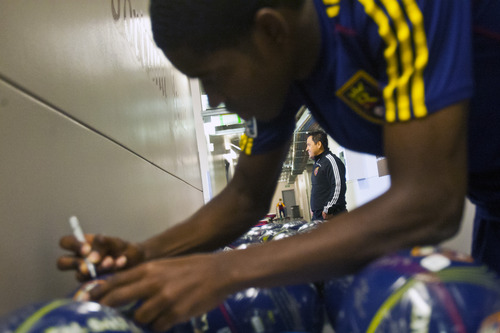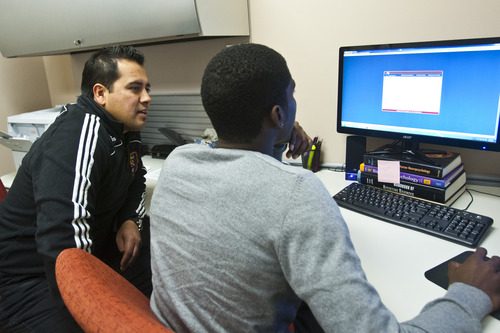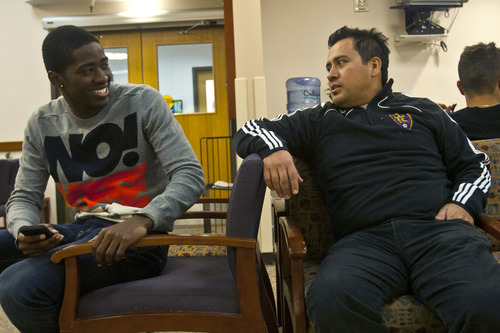This is an archived article that was published on sltrib.com in 2013, and information in the article may be outdated. It is provided only for personal research purposes and may not be reprinted.
It was a few weeks into Real Salt Lake's preseason training when Olmes Garcia stepped off the airplane near Casa Grande, Ariz., that day in mid-February.
The striker from Deportes Quindio brought both promise and uncertainty.
He was just 20 years old, leaving his home in Colombia for the first time, and spoke only Spanish.
The five-year contract he was about to sign was written in English.
That's why Salvador Perez was waiting for him at the airport.
"The first thing when I arrived," Garcia, a promising young striker, says through a translator, "the coaches told me, 'Sal is going to be your best friend.'"
Perez, who got his start with RSL in 2009 in ticket sales and then in marketing, has seen his duties transformed this season, as RSL's first player liaison.
Real's roster has featured plenty of foreign players, particular from Latin American countries, and Perez had been called upon in the past to assist the likes of Javier Morales, Alvaro Saborio and Fabian Espindola in getting adjusted. But this offseason when RSL brought in Garcia and forward Joao Plata, a pair of 20-year-old forwards with almost no English skills, the team felt a more hands-on approach would pay larger and more immediate dividends on the field.
"We really felt like if we were going to go to a younger group that we needed some help with that. We knew we were going to sign some younger foreign players and we needed them to contribute," RSL general manager Garth Lagerwey said. "The only way to make that happen was to do it differently."
Perez's role balances errands and office work and teaching moments. He helps players and coaches communicate during training and sits in on team meetings to help translate. Last week, he took Garcia downtown for a checkup on an injury he suffered in a match. For Garcia, Perez is a lifeline he could ill afford to do without: Not only is he still learning English, but the player doesn't yet have a driver license.
Perez, who was born in Mexico City and worked at the Mexican consulate in downtown Salt Lake City, knows the challenges of adjusting to a new country.
"You can bring the best player in the world, you can bring the most smart person in the world, you can bring the most rich person in the world," Perez said, "but if they don't know the system, it's still hard for them to figure it out."
So Perez helps close those cultural and informational gaps. He's helped set up bank accounts, apply for Social Security numbers, find housing and taught young men how to do their own grocery shopping.
"It's funny," he said. "Sometimes, those guys don't even know how to do laundry."
The end result is players who are more comfortable and focused on soccer.
"I think the off-the-field stuff matters as much as the on-the-field stuff when it comes to settling in a new country," Lagerwey said. "A businessman going to a new country would have a guaranteed job. They wouldn't be coming in just to fight for a spot. The business would have access to communicate in their native language, and they would have a support staff to integrate them. We need to make sure these players are as comfortable. I think sports teams have been a little slow to that game."
Perez enjoys the work, and the chance to be close to soccer, something he calls not just a game but a "way of life."
"This, for me, is kind of like a passion too," he said. "The way I see soccer, soccer is not just playing. You can be around the game in other ways."
Garcia certainly credits Perez for an assist.
"In this moment, he is helping me," Garcia says, with Perez acting as translator. "It is very important. Always, I'm going to appreciate that help. I'm going to appreciate him because he's very important to the team." —
Salvador Perez
• Started working for Real Salt Lake in 2009 as a ticket sales rep.
• Named the team's player liaison this season.







